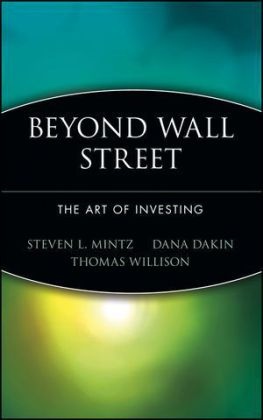Read more
Informationen zum Autor STEVEN L. MINTZ is the New York Bureau Chief at CFO Magazine, a publication of The Economist Group dedicated to the latest financial thinking and how it is being implemented in today's world. He is also author of Five Eminent Contrarians.DANA DAKIN and THOMAS WILLISON are founders of Dakin & Willison, a marketing and communications consulting firm for the financial services industry and a co-producing partner with WNET for the PBS series. Klappentext Beyond an investment process that involves charts, formulas, and financial analyses lies an art based on imagination and timeless tenets. Beyond Wall Street showcases the masters of the art of investing: those whose success is built upon vision, brilliance, and the classic principles from which anyone can learn. This unprecedented book, based on the popular PBS series, features a gamut of investment styles and subjects, from global investing to mutual funds, emerging markets to index funds, value investing to quantitaive analysis, fixed-income securities to investor psychology. Beyond Wall Street compares and contrasts the strategies of eight of the world's leading investors through substantive and compelling tales of what brought them to their successes. Unique, thoughtful, and often irreverent, these prominent figures reveal, to the expert and novice investor alike, how brilliant investing is a feat of creativity, composition, and conviction. Foster Friess founded the Brandywine Fund in 1985 and has managed it to a stunning 560.4% return on investment and an annual average of 18.3%. When you buy a stock, "forget what you paid for it and when you bought it. We only want to look at where the stock is going. It doesn't matter where it's been." Steward for more than 30 years of the hugely successful Windsor Fund, now retired John Neff scored in value investing by buying downtrodden stocks with confidence that the pendulum will swing back for sound companies that have fallen from grace. Neff's kind of company bangs pots and pans in the dim, dusty, and foreboding basement. To Neff, that cacophony sounds like great investments calling for attention. Bringing a messianic fervor to quantitative analysis, Barr Rosenberg's computer-driven strategies are firmly planted in traditional, fundamental stock analysis. "The idea is to look at companies that are in similar businesses, compare them with one another, and find the ones that are the most attractive." President of the $13 billion Templeton Emerging Markets Fund, Mark Mobius is deemed the "Indiana Jones" of investing. "By seeing companies firsthand, you gain confidence. If you read only the press you get swamped by negative information." Winner of the Nobel Prize for economics, William Sharpe has added fresh dimensions to the notions of risk and reward. Sharpe's strategy of indexing outperforms most professional money managers most of the time. "Pick the right amount of risk and return for your situation, your willingness to bear risk. And then leave it alone. Don't jump because there's a headline in the paper." William Gross is one of the visionaries who helped haul bond trading out of the basement vault. He launched-and still runs-Pacific Investment Management's bond trading operation, which commands close to one percent of the $11 trillion U.S. bond market. "If the market is strong, our assets could be a half a billion dollars more than when I woke up this morning." CEO of Brinson Partners, Gary Brinson manages $120 billion for blue chip clients who seek optimal returns across a global gamut of asset classes. Growing ranks of global asset allocators select the safest mix of calories and cholesterol, subject to a client's required returns and appetite for risk. Such is Brinson's pioneering role in understanding, articulating, and applying this investment style. Author and investment advisor Peter Bernstein analyzes financial systems, from the progress of risk measurement to the l...

